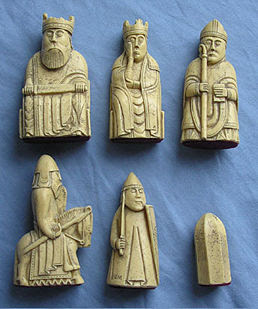 12th Century Chess pieces.
12th Century Chess pieces.The game of Chess has been attributed to the Indians both by the Persians and by the Arabs. However, the origin of the game remains lost in antiquity. The words for chess in Old Persian and Arabic are chatrang and shatranj respectively — terms derived from chaturanga in Sanskrit, which literally means an army of four divisions.
Chess spread throughout the world and many variants of the game soon began taking shape. This game was introduced to the Near East from India and became a part of the princely or courtly education of Persian nobility. Buddhist pilgrims, Silk Road traders and others carried it to the Far East where it was transformed and assimilated into a game often played on the intersection of the lines of the board rather than within the squares. Chaturanga reached Europe through Persia, the Byzantine empire and the expanding Arabian empire. Muslims carried chess to North Africa, Sicily, and Spain by the 10th century. The game was developed extensively in Europe, and by late 15th century, it had survived a series of prohibitions and Christian Church sanctions to almost take the shape of the modern game. The modern times saw reliable references works, competitive chess tournaments. and exciting new variants add to the popularity of the game, further bolstered by reliable time mechanisms, effective rules and charismatic players.
Chess spread throughout the world and many variants of the game soon began taking shape. This game was introduced to the Near East from India and became a part of the princely or courtly education of Persian nobility. Buddhist pilgrims, Silk Road traders and others carried it to the Far East where it was transformed and assimilated into a game often played on the intersection of the lines of the board rather than within the squares. Chaturanga reached Europe through Persia, the Byzantine empire and the expanding Arabian empire. Muslims carried chess to North Africa, Sicily, and Spain by the 10th century. The game was developed extensively in Europe, and by late 15th century, it had survived a series of prohibitions and Christian Church sanctions to almost take the shape of the modern game. The modern times saw reliable references works, competitive chess tournaments. and exciting new variants add to the popularity of the game, further bolstered by reliable time mechanisms, effective rules and charismatic players.




No comments:
Post a Comment